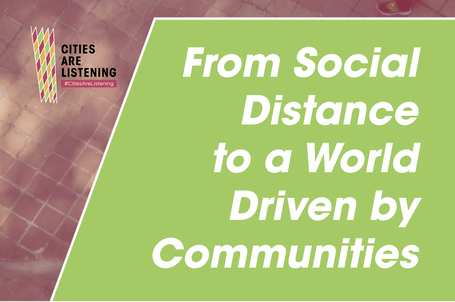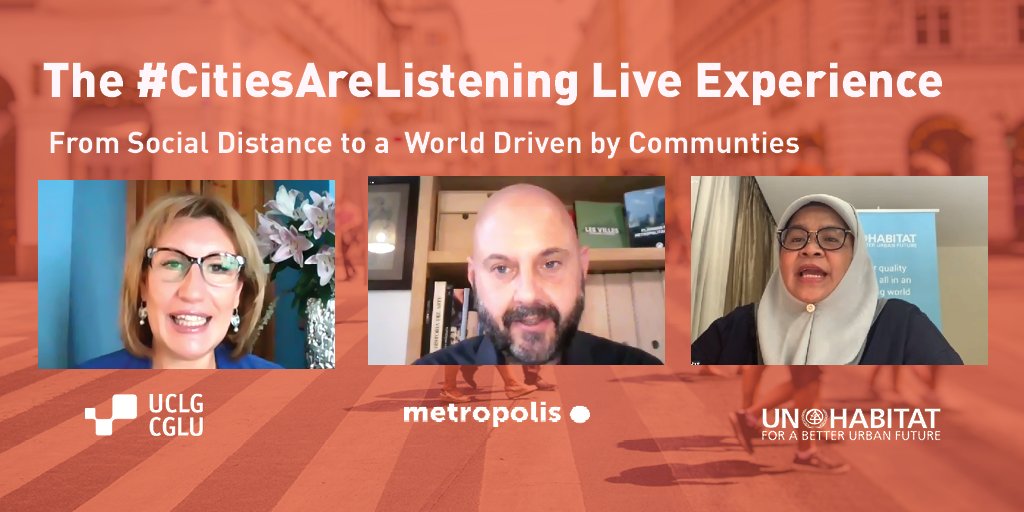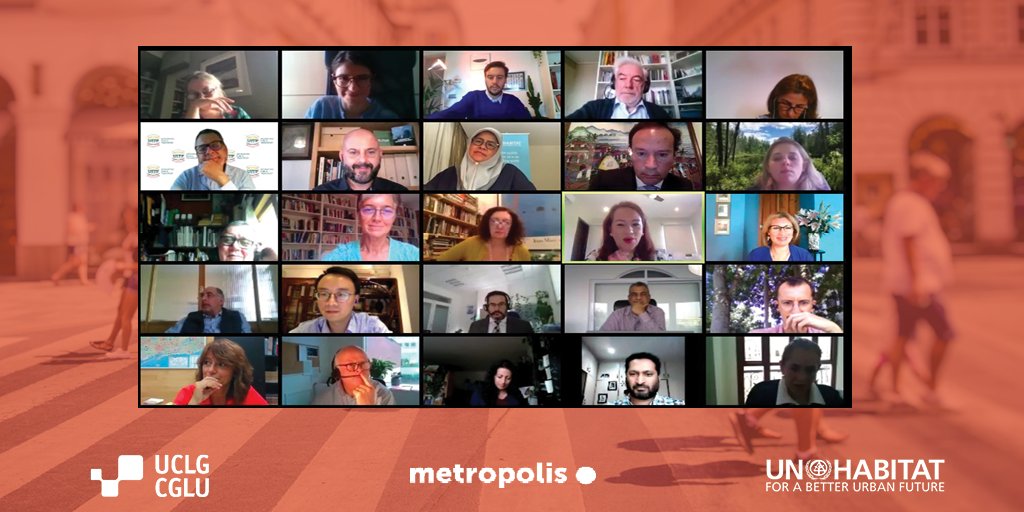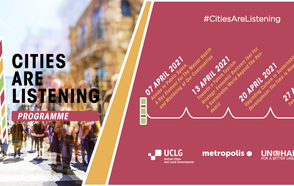
Local and regional governments around the world are at the forefront of the current health, economic, and social crisis. But a single town, a single city, or a single region will not get through this alone.
Over the past months UCLG, Metropolis and UN-Habitat have hosted a series of online Live Learning Experiences (LLEs), adding up to more than 40 hours of idea sharing and featuring case studies from over 130 cities and regions. These online thematic sessions brought together mayors and experts from all over the world to discuss mobility, technology, gender equality, housing, culture, peace, local democracy, public services, accessibility, and much more.
The LLEs sessions reveal that the current crisis can also be the chance to plan and to share our views for a future that leaves no one behind. Mindful of the collaboration with global partners, the next phase in this process is the #CitiesAreListening Experiences, spaces of dialogue and interaction to define the way forward, in an open format to debate and discuss.
This brainstorming session explored with participants their priorities in the post-COVID era, and what the local and regional governments’ constituency needs to consider moving forward. This first session also aimed at going beyond the shared priorities, and engaging on how to best organize the living community, leverage our connectivity and collective power and transform recommendations into actions.
 The session was introduced by Emilia Saiz, Secretary-General, UCLG, Octavi de la Varga, Secretary-General, Metropolis, and Maimunah Mohd Sharif, Under-Secretary-General of the UN and Executive Director of UN-Habitat.
The session was introduced by Emilia Saiz, Secretary-General, UCLG, Octavi de la Varga, Secretary-General, Metropolis, and Maimunah Mohd Sharif, Under-Secretary-General of the UN and Executive Director of UN-Habitat.
“Each of you is part of this big opportunity of connecting experiences and ideas our communities, the multi-stakeholders, local and regional governments and civil society partners” Emilia Saiz, UCLG Secretary-General
“Solidarity has been at the heart of the network throughout the pandemic, and this principle should guide us in this next step where #CitiesAreListening” Maimunah Mohd Sharif, Under-Secretary-General of the UN and Executive Director of UN-Habitat.
“We need to move from exchanging to action. When the pandemic went worldwide, we were only rising from the previous crisis. Everyone was making a promise, and none were fulfilled. This pandemic can, however, allow local and regional governments to be at the forefront and put to the service of our communities.” Octavi de la Varga, Metropolis Secretary-General.
The sum of speakers in the session, was a total of over 20 and included representatives of cities, of the local and regional networks, members from our partners from the civil society; and representatives from Academia, gathered together to share their views for a world of solidarity, and the ways in which the municipalist movement can benefit from the knowledge shared and truly contribute to the change that our communities need. These are the people, and constituencies, that took part in the first session, and that will accompany us throughout the process.
Puvendra Akkiah, Manager of integrated development plans of eThekwini Municipality; Adriana Allen, President of the Habitat International Coalition; Víctor Pineda, President World Enabled; Laia Bonet, Vice-Mayor of Barcelona; María Soledad Cisternas Reyes, United Nations Special Envoy on Disability and Accessibility; William Cobbett, Director of Cities Alliance; Maria Fernanda Espinosa, President of the 73rd session of the United Nations General Assembly; Ana Falú, UCLG UBUNTU advisor; Vasu Gounden, Executive Director of the African Centre for the Constructive Resolution of Disputes; Barbara Holtmann, Author, Safer Community of Opportunity Tool; Luz Amparo Medina, Director of International Affairs of Bogota; Mohamed Mezghani, Secretary-General of the Union Internationale des Transports Public (International Union of Public Transports); Shi Qi, Director of the Center for International Friendship Cities of Xi'an; Aromar Revi, Director of the Indian Institute for Human Settlements, UCLG UBUNTU Advisor; Julien Simon, Regional Coordinator for the Mediterranean for the International Center for Migration and Policy Development; Lucy Slack, Deputy Secretary-General, Commonwealth Local Governments’ Forum; Franz Vanderschueren, Director of Urban Safety, Universidad Alberto Hurtado; Lorena Zarate, Global Platform for the Right to the City, all gathered to bring the priorities of the various constituencies and to ensure that cities would listen and, together, bring about a future for all stakeholders.

The inputs from the participants have laid the groundwork to kickstart the #CitiesAreListening experience. Throughout the session, even with the varied viewpoints for participants, many common points arise such as the need to carry out joint advocacy, in particular regarding the need to strengthen and adequately fund basic public services, caring for those that provide them for our communities. The New Urban Agenda and the SDGs remain, as is shown in the UCLG Decalogue for the post-COVID era, the valid frameworks for the transformation and the recovery in the coming years, a sentiment that has been strengthened by how the crisis has shown that no single goal can be achieved in isolation.
Speakers argued for the need for maintain the structural dialogue that had been opened up by the UCLG TownHalls and consolidated now. This would be an instrument to enhance exchanges, not only between constituencies and local and regional governments, but also between spheres of government and -perhaps the more critical innovation- bringing donors into the conversations about the recovery in order to ensure that the funding reaches the communities that need it the most, and we develop more resilient societies.
Participants acknowledged the inherent risk that our societies are currently living. While COVID-19 is the most pressing, other risks such as the climate emergency, and the potential of urbanization, were highlighted as the most important trends in the future, with participants arguing on the need to interact and think, using the knowledge shared during the pandemic and beyond, in a different manner in the coming years. To spur this new way of thinking, it is shared data and indicators on the current situations, and guidelines on the way forward, need to be produced to be able to align priorities.
The session wrapped up with a call to participants to keep in mind not only the issues that we are keen on defending, but also to express how and why issues such as the defense of basic services are critical to the conversations about our development model, and even to the safeguarding of democracy.
In the coming weeks, exchanges between cities and partners will continue in therenewed #CitiesAreListening space, which will be the start of a journey to define joint actions, advocacy and instruments. Keep tuned to follow the outcomes of this co-creation process.
- Read the full press release here.











